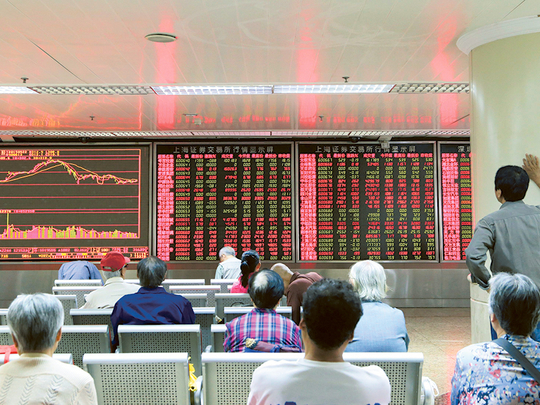
New York: In financial markets, China is firmly entrenched in the driver’s seat, according to David Woo.
During an interview on BloombergTV, Bank of America’s Head of Global Rates and Currencies Research outlined how the sell-off in stocks and relatively tepid decline in bond yields since the devaluation of the Chinese yuan affirm his theory for what’s been driving equity and fixed income markets.
If we knew that in the wake of this event, the S&P 500 would be down between five to six per cent and expectations of a Fed rate hike were pushed out until March 2016, said Woo, there’s no way we’d expect the 10-year US Treasury yield to be down less than 20 basis points and still above two per cent.
He finds these dynamics to be consistent with the notion that the People’s Bank of China has been selling US debt in size, putting upward pressure on yields, in order to support its domestic currency. China’s ability to have outsized influence over both risk assets and the world’s preferred safe haven is evidence of its current pre-eminence in financial markets.
“China is still more important than the Fed, as far as the broader market is concerned,” said the strategist.
Woo said the most important development in 2015 has been the unprecedented rate of capital outflows from China, which have prompted defensive currency intervention by Beijing.
“Half of New York has been bought up by the Chinese because money is leaving China in search of a safe haven,” he quipped.
The prophesied divergence in monetary policy between the world’s two largest economies has yet to be fully realised, which Woo believes has a lot to do with how China’s reaction to lift-off in the US could amplify the tightening of financial conditions.
If the Fed raises rates, the People’s Bank of China will likely be forced to sell more US Treasuries in order to maintain its dirty peg to the greenback. This, according to Woo, would “compound the effect of a lousy 25 basis point hike from the Fed.”
The strategist reiterated that the endgame for China is to let its currency depreciate as part of a package of monetary easing, and said his gut tells him the yuan could be in for a drop of up to ten per cent. And options markets aren’t pricing in a devaluation of that magnitude over the next year, setting the stage for a volatile adjustment period.
Woo sees the market reaction to an eventual Chinese currency depreciation playing out in two phases.
First, this move would send a deflationary impulse around the world, inspiring competitive devaluations in select emerging markets and further weakness in commodity prices. The Fed would be unable to hike rates against this backdrop, said Woo, and the yield on the US 10-year Treasury would slide to around 1.7 per cent.
Secondly, the ensuing weakness will open the door for “Chinese-style QE,” which would send investors rushing into beaten-up emerging markets and basic commodities.
All roads lead to more currency devaluation from China, according to Woo, because the authorities’ desire to have the yuan included in the IMF’s basket of reserve currencies has and will continue to play a role in dictating monetary policy and foreign exchange management in the world’s second-largest economy.
“There’s a Chinese saying: once you mount the back of a tiger, you cannot get off, because otherwise you’re going to get eaten by a tiger,” the strategist explained. “If you do not follow down this path of letting renminbi go and easing monetary policy I think everything they’ve done towards the SDR [currency basket] would’ve been gone to waste, if not outright counterproductive.”












